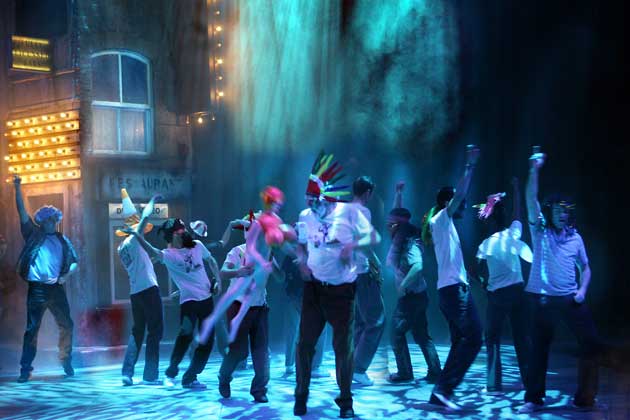RSC haka angers Maori tribe
Theatre company accused of showing contempt for the traditional dance in its production of ‘The Taming of the Shrew’

Your support helps us to tell the story
From reproductive rights to climate change to Big Tech, The Independent is on the ground when the story is developing. Whether it's investigating the financials of Elon Musk's pro-Trump PAC or producing our latest documentary, 'The A Word', which shines a light on the American women fighting for reproductive rights, we know how important it is to parse out the facts from the messaging.
At such a critical moment in US history, we need reporters on the ground. Your donation allows us to keep sending journalists to speak to both sides of the story.
The Independent is trusted by Americans across the entire political spectrum. And unlike many other quality news outlets, we choose not to lock Americans out of our reporting and analysis with paywalls. We believe quality journalism should be available to everyone, paid for by those who can afford it.
Your support makes all the difference.It is a clash of cultures spanning thousands of miles and hundreds of years. On one side is the venerable Royal Shakespeare Company; on the other the Maoris of New Zealand and their historic dance ceremony, the haka.
Yesterday the two traditions collided, with angry results, as the world-renowned Stratford-upon-Avon theatre company was accused of showing contempt for traditional Maori culture.
The RSC’s latest production of The Taming of the Shrew, which opened at the Novello Theatre in central London last week, opens with a rowdy stag party. As the men stumble out of a strip club (still clutching a blow-up sex doll), they perform a dance inspired by Ka Mate haka – as performed in all international matches by the All Blacks rugby team. In an unfortunate variation, the stage version ends with the dropping of trousers down and the audience being “mooned”.
While the audience was amused, the New Zealanders are not: the flippant reference to the traditional dance came just days after the New Zealand government officially ruled that a North Island Maori tribe, Ngati Toa, owns the intellectual rights to the haka and is to be paid millions of dollars in compensation.
The tribe has fought to protect the sacred ritual from inappropriate use, pursuing its claim through years of discussions with the government. New Zealand courts ruled that the originator of the haka was the chief of the Ngati Toa tribe, Te Rauparaha, as it was written to celebrate his escape from death in a battle in the 1820s.
While the Ngati Toa tribe is not expected to claim royalties from the agreement, it is officially allowed to police long-term grievances about its inappropriate use. The RSC has the dubious distinction of being the first body accused of misusing the dance since the Maoris won their case.
Matiu Rei, a Ngati Toa spokesman, said yesterday: “That certainly isn’t an appropriate use of the haka. If it was just for effect and used in a gratuitous manner – which it sounds like it was – then I would be very disappointed. I’ll consult with my chiefs and we’ll see what they decide on what further action to take.”
Karl Burrows, a Maori living in the UK, runs a company which promotes the tribe’s culture. He was furious yesterday about the RSC’s casual use of the sacred ritual. “Everybody from our culture would resent that because it’s just not appropriate. When we see our haka performed in a way that’s disrespectful it hurts us as a people.
“It’s passed down to us by our ancestors so we need to see it done properly and with the right respect, otherwise you’re attacking us. They’re presenting somebody else’s culture in an inappropriate context. They should have gone to see the owners of this haka and talked to them about what they wanted to do. [The RSC] is a really respected organisation and it should know better than to just take something from someone else’s culture and treat it in such a disrespectful way.”
The RSC declined to comment on the matter last night.
Join our commenting forum
Join thought-provoking conversations, follow other Independent readers and see their replies
Comments